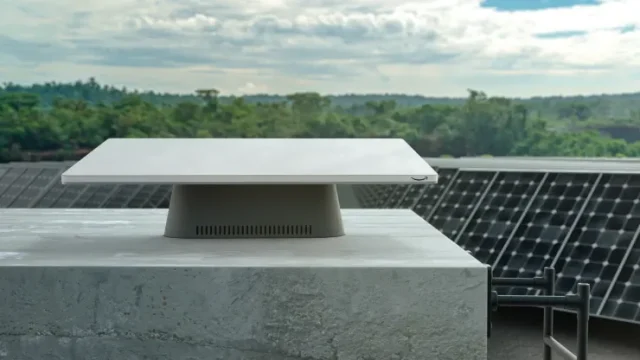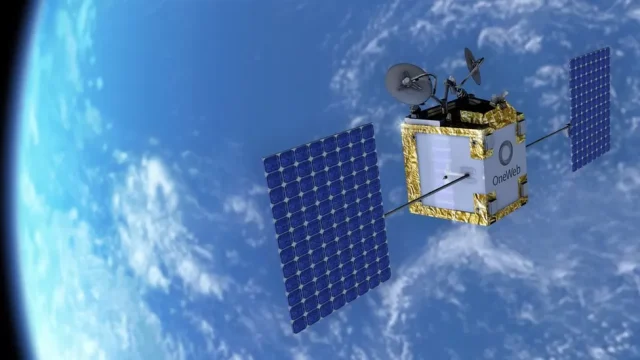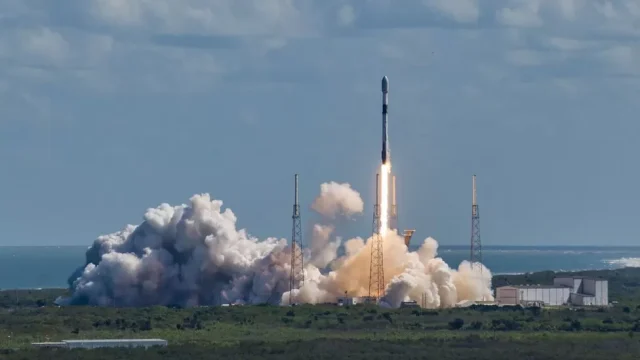Starlink is a game changer for those who travel and work and explorers who benefit from the security, peace of mind, and seamless connectivity that satellite-distributed internet access provides. Soon there will be nowhere on Earth without a high-speed internet connection, with all the positives and negatives that come with it. One thing is certain: competition is good for the consumer, and two additional service providers will likely lower costs and improve service overall.
Amazon recently revealed a trio of satellite antennas as it prepares to compete with SpaceX’s Starlink with its own Project Kuiper internet network. The tech giant plans to build a network of 3,236 satellites in low Earth orbit to provide high-speed internet anywhere in the world. Amazon’s largest “pro” model is a high-bandwidth version for more demanding customers, such as military vessels or oil rigs in the middle of the ocean. It will deliver speeds up to 1 gigabit per second via space.

While Amazon has not revealed what it expects the monthly service cost for Project Kuiper customers, it has stated that the “standard” version of its satellite antenna is expected to cost less than $400 each to produce. An “ultra-compact” model is its smallest and most affordable design, weighing about 1 pound and offering speeds up to 100 Mbps.

Meanwhile, London-based satellite operator OneWeb is nearing the completion of its in-orbit broadband constellation, putting the company in direct competition with Elon Musk’s Starlink. The company recently launched another forty into space, bringing the total number of satellites in its constellation to over 580. One more launch in the coming weeks will give OneWeb enough satellites to deliver an internet connection anywhere on Earth.
CEO Neil Masterson stated that OneWeb now serves customers in 15 countries north of 50 degrees in latitude, including the UK. Newly launched satellites take time to properly position themselves 1,200 km above the Earth and come online. Still, last year’s batches will extend coverage to the lower 48 US states and the northern Mediterranean by the end of May. By the end of the summer, coverage will expand to 25 degrees North, which includes Mexico, Northern Africa, and India.
OneWeb’s final launches will provide broadband connectivity to users at the equator by the end of the year. The same pattern for the Northern Hemisphere will be repeated for the major land areas in the Southern Hemisphere, including Antarctica, once the necessary ground stations are installed to complete the data links.

OneWeb’s satellite fleet is divided across 12 separate planes in the sky and must be managed 24/7, making it an enormous software undertaking. Unlike Starlink, OneWeb is not selling broadband connections directly to individual users; its clients are primarily telecommunication companies that provide internet services. However, they may also use the connectivity to supplement or expand their mobile phone network infrastructures.
A typical service plan to a user’s terminal or antenna system could be 75 megabits per second (MBPS) download and 15 MBPS upload. However, low latency, or the reduced time it takes for data to make a round trip over the network, is a critical aspect that both OneWeb and Starlink highlight.

With OneWeb nearing the completion of its broadband constellation and Amazon’s Project Kuiper launching soon, the competition with Starlink is heating up. It remains to be seen which company will dominate the market. Still, with the increasing demand for high-speed internet globally, there is room for multiple players to succeed while traditional broadband service providers adapt to a new market.
As travelers and explorers, we stand to benefit directly from on-demand internet connectivity when we need it, no matter how remote we may be. Whether working remotely on a beach in Baja, being able to arrange medical treatment or the recovery of a vehicle after an accident, or having the freedom to travel and stay in direct contact with our loved ones, we have experienced the power of the internet on demand and wondered how we ever lived without it.
aboutamazon.com/what-we-do/devices-services/project-kuiper
Our No Compromise Clause: We carefully screen all contributors to ensure they are independent and impartial. We never have and never will accept advertorial, and we do not allow advertising to influence our product or destination reviews.


